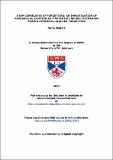ERP correlates of forgetting: an investigation of resource allocation as a potential neural mechanism behind retrieval-induced forgetting
Abstract
The present study was aimed at investigating a potential mechanism behind
retrieval-induced forgetting that we have termed resource allocation. Three
experiments were designed around the notion that increasing the number memories
associated with one concept may reduce retrieval-induced forgetting by spreading out
the limited resources available for that concept. In two experiments, we expanded the
standard retrieval-induced forgetting (RIF) paradigm by increasing the number of
items in each category and varying the amount of Rp+ and Rp- items. In one of these
experiments, we recorded event-related potentials (ERPs) to examine the
electrophysiological correlates of retrieval-induced forgetting. We then compared
these findings to a standard version of the RIF paradigm as a control experiment. All
three experiments produced significant facilitation effects, but failed to produce
retrieval-induced forgetting. The absence of RIF in the present study, however, when
combined with the imaging data allows us to discern the ERP correlates of selective
retrieval from those of retrieval-induced forgetting. In the discussion, we present our
case against conclusions drawn in other studies about the ERP correlates of RIF, and
suggest that the characteristic frontoparietal components often found in RIF studies
reflect the neural correlates of selective retrieval rather than inhibition.
Type
Thesis, MPhil Master of Philosophy
Collections
Items in the St Andrews Research Repository are protected by copyright, with all rights reserved, unless otherwise indicated.

